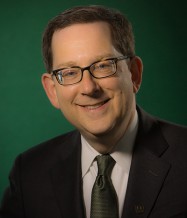You have /5 articles left.
Sign up for a free account or log in.
 The president of the University of Oregon, Michael H. Schill (right), has weighed in on the continuing controversy over Nancy Shurtz, a law professor whom the university found violated anti-harassment policies when she wore blackface to a party to which she had invited students. Since the university in December announced its findings that she had violated policy, many experts on the First Amendment and academic freedom have criticized the university, saying that it should not be punishing what was an expressive act by Shurtz, regardless of how offended many people were by her act.
The president of the University of Oregon, Michael H. Schill (right), has weighed in on the continuing controversy over Nancy Shurtz, a law professor whom the university found violated anti-harassment policies when she wore blackface to a party to which she had invited students. Since the university in December announced its findings that she had violated policy, many experts on the First Amendment and academic freedom have criticized the university, saying that it should not be punishing what was an expressive act by Shurtz, regardless of how offended many people were by her act.
In an email message to the campus, Schill -- who is a law professor as well as president -- acknowledged that the issues are complicated. While stressing that under Oregon's procedures, the provost was in charge of handling the case, Schill defended the idea that some sanction of Shurtz was appropriate. "Some of her students felt that they were in a similar situation to students in a classroom being subjected to harassing speech, as they felt pressure to attend and to remain at the event. They felt that they could not leave without jeopardizing their standing in the class, and they also felt that the offensive nature of the blackface was the equivalent of hearing the N-word," Schill wrote. "In these circumstances, should the university have ignored the event or should it have taken action proportionate to the offense? What lesson would we be teaching our students if we let the incident end without even an official letter of reprimand?"
Further, he denied that academic freedom was endangered because of the university's handling of the case, as some have suggested.
"Some commentators have taken to the barricades and suggested that any finding or action taken with respect to Professor Shurtz will ultimately open the door to firing professors for expressing their political views," he wrote. "Really? In law, we call this the 'slippery slope' argument or 'the parade of horribles.' While I have tossed and turned for nights over the fact that the university found that a professor’s expressive conduct constituted harassment, I think the reaction of those commentators is overly dramatic and not supported by anything that took place in this case. Go online and you will find that Professor Shurtz remains a member of the law school faculty. Name a single faculty member who has been punished by the provost for his or her political views. This has not happened, and you have my vow it won’t happen as long as I occupy my office in Johnson Hall."




